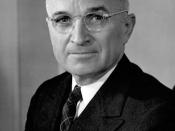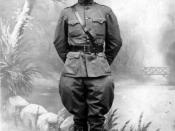The dropping of the Atomic Bomb on Hiroshima, Japan, in 1945 was one of the most controversial decisions of the 20th century. It caused a great deal of hardship for many Japanese citizens and created some anti-American sentiment in the decades since. However, due to the prediction of a great number of American and Japanese casualties, Japanese stubbornness regarding surrender, and the immediacy of an end to the war, President Truman acted wisely in deciding to drop the A-Bomb.
Japanese traditional culture taught that surrender was a form of cowardice. Therefore, it was naturally ingrained into the Japanese to fight to the death. At the battles of Okinawa and Iwo Jima, Japanese military units fought to the death which led to a prolonging of the war and additional, unnecessary casualties on both sides. After the Battle of the Mariana Islands, a whole company of would-be surrendering Japanese chose rather to jump off of cliff and perish on the rocks below than to surrender.
Kamikazes were suicidal pilots who would crash their planes, which were packed with explosives, into American naval vessels. The Japanese were not a people accustomed to surrendering, and through their actions, they created the need to drop the Atomic Bomb.
One cannot argue that the Japanese were not warned. At the Potsdam Conference in Germany, President Harry S. Truman issued a stern ultimatum to the Japanese government: surrender unconditionally or be destroyed. The Allies had already defeated the Axis Powers in Europe and wanted to see the conflict in the Pacific ended as soon as possible. Once the guns across the world fell silent, a peace treaty could be created, and the extensive process of rebuilding many war torn nations could begin. Since the Japanese mainland had already been bombed previously to the dropping of the A-Bomb,


